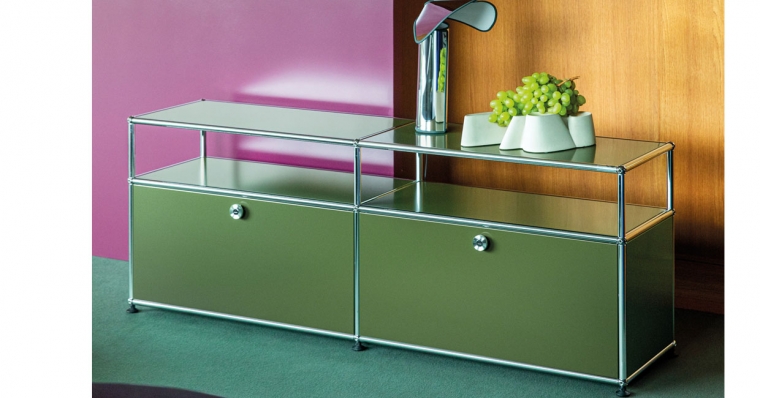Modular furniture manufacturer USM, is making strides in its sustainable policy, following on from its 2021-22 Sustainability Report which detailed its ambitious future commitments.
The principles of circular design have been at the very core of USM’s philosophy since the 1960s. It was during this decade that Paul Schärer, the third generation of this family-run business, commissioned architect Fritz Haller to design a new factory and, two years later, created the iconic USM Haller modular storage system. With its modular nature and durability, this product was designed to be forever reconfigured.
In recent years, USM’s outlook on sustainability has extended circularity principles beyond its product portfolio, and seeks to apply this philosophy across the whole enterprise, from communications to operations.
Significantly, USM’s targets have been officially approved by the Science Based Targets initiative (SBTi) – the global climate action organisation which shows companies how much and how quickly they need to reduce their emissions to prevent the worst effects of climate change.
“The target approval is an extremely rigorous process and we are proud to have achieved this status,” comments Ian Weddell, USM Sustainability Executive. “The SBTi commended our targets for our operational emissions, currently the most ambitious designation available through the SBTi process.”
USM has committed to reducing absolute scope 1 and 2 GHG emissions by 42% and scope 3 emissions by 25% by 2030 (from a 2021 base year). Scope 1 and 2 refers to operational emissions directly within the company’s control, such as heating, electricity and combustion from its vehicle fleet. Examples of scope 3 emissions include production materials, purchasing of manufacturing equipment, logistics (supply and distribution) and commuting.

Within the sustainability report, USM laid out its roadmap for emissions-reduction. Key measures include purchasing CO2-reduced steel for 20% of supply in 2024, applying air freight policies and electrifying its vehicle fleet.
“Reducing our emissions at such a challenging rate is a stimulating challenge for a company with such a rich heritage in design and engineering,” comments Dr Thomas Dienes, Director of Sustainability at USM.
“One of the solutions that appeals to us the most is the circular economy. The flexibility and longevity that comes with a modular system such as USM Haller brings enormous opportunity for reuse, repair and remanufacturing as well as different business models like rental or furniture-as-a-service. We are exploring how these can work for our customers in order to fully maximise the lifespan of our products.”
In addition to its science-based targets, USM also holds Cradle to Cradle certifications for its two main product lines, USM Haller and USM Kitos M, and Greenguard Gold certification for USM Haller and USM Kitos.
It’s inspiring to witness a company re-evaluate its approach right across the board, ensuring that every aspect of the business is performing in as sustainable a manner as possible. Given its dedication and the ambitious nature of its targets, USM’s progress will certainly be something to behold.







